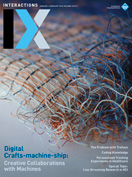Authors:
Ryo Tada, Richard Vijgen, Jennifer Lang, T. McLeish, Paul Pangaro
FULU is a fingernail-mounted haptic interface for augmented reality in daily life. It allows users to experience haptic texture in the virtual world, while the finger pad remains open for experiencing the physical world. Users thus experience virtual and physical touch seamlessly and simultaneously. FULU creates touch sensation from 2D images, adding 3D depth to 2D screens.
Houghton, L., Hawkins, A., and Friend, H. Need to Know 04:07:19. LS:N Global; https://www.lsnglobal.com/news/article/24353/fulu-makes-the-digital-experience-tactile?fbclid=IwAR0jjUetJdWb6ibWujYan-mchsWRaj-PzxX4md0BnK5Hs66yUkmSFUI0GI0
https://www.ryotada.com/#/fulu/
Main video: https://youtu.be/xKvPcPK4pPw
Demo video: https://youtu.be/iFJG1j1golM
Ryo Tada, Royal College of Art / Imperial College London
[email protected]
 |
Interaction demo of FULU. Using a mobile app to feel the virtual texture. |
 |
FULU, a fingernail-mounted haptic interface. |
WiFi Impressionist is a field installation that draws electromagnetic landscapes inspired by the cityscapes of William Turner. The work consists of a directional antenna on a pan-tilt mechanism that listens for WiFi signals and builds a 3D model of the signals around it. From this model, a viewport is selected that defines the perspective and the frame. Signals that are picked up within the frame are visualized as waves emitted from a specific origin and drawn using a mobile plotter, much like a painter would set up his easel. Once positioned and oriented, a drawing becomes denser over time.
http://www.wifiimpressionist.com
Richard Vijgen, Studio Richard Vijgen
[email protected]
 |
WiFi Impressionist draws electromagnetic landscapes based on the WiFi signals it detects in the surrounding area. |
 3. Renewal — Limitless Lifetime
3. Renewal — Limitless Lifetime
Have you ever dreamed of living forever, fixing the body like a car by simply buying a new lung or kidney in a specialist shop? All this could become reality more quickly than expected. Bioprinted organs are within our grasp—but for whom are these luxuries available?
Renewal examines how speculative design can help in the evaluation of new technologies—in this case human enhancement—and their impact on society. With the support of my professors Christoph Büch and Lauritz Lipp, I created the first organ trade of the future.
Kirst, N. Speculative design: Sieht so der organhandel der zukunft aus? Page. Sept. 7, 2019; https://page-online.de/branche-karriere/speculative-design-sieht-so-der-organhandel-der-zukunft-aus/
https://www.youtube.com/watch?time_continue=1&v=kl9TOHfHvlw
Jennifer Lang, University of Applied Sciences Europe
[email protected]
 |
Renewal envisions a future shop for bioprinted organs. |
The organic and analog forms provoke new answers to today's pressing question: What do we want from conversations with machines?
Colloquy 2018 is a full-scale replica of Gordon Pask's Colloquy of Mobiles. This historic work first appeared at the storied Cybernetic Serendipity exhibition in London in 1968. Colloquy represents a pivotal moment in interaction design and interactive art. Male and female mobiles converse with each other and with humans to express desire, competition, and satisfaction. They do so with delight and humor. The organic and analog forms provoke new answers to today's pressing question: What do we want from conversations with machines? The work will be shown at Centre Pompidou in Paris as part of their Brain Simulated Intelligence exhibition, opening February 26, 2020.
Pangaro, P. and McLeish, T.J. Colloquy of Mobiles 2018 project. AISB 2018 Symposium: Cybernetic Serendipity Reimagined. AISB, 2018; https://vimeo.com/272963144
T.J. McLeish
[email protected]
Paul Pangaro, Carnegie Mellon University
[email protected]
 |
The full Colloquy 2018 replica. Three female mobiles and two male mobiles engaging in machine—machine conversation. |
 |
The Colloquy 2018 replica looks and behaves like Gordon Pask's original, exhibited at London's Institute for Contemporary Arts in London, 1968. |
©2020 ACM 1072-5520/20/01 $15.00
Permission to make digital or hard copies of all or part of this work for personal or classroom use is granted without fee provided that copies are not made or distributed for profit or commercial advantage and that copies bear this notice and the full citation on the first page. To copy otherwise, to republish, to post on servers or to redistribute to lists, requires prior specific permission and/or a fee.
The Digital Library is published by the Association for Computing Machinery. Copyright © 2020 ACM, Inc.







Post Comment
No Comments Found